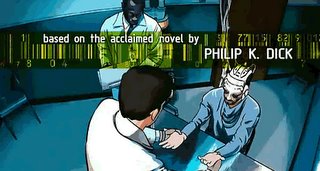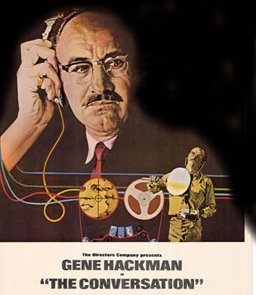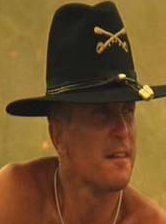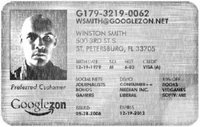
When I first saw the trailers for
A Scanner Darkly, the new Richard Linklater movie, I became immediately geeked out. Linklater is one of my favorite filmmakers, and
Waking Life one of my favorite of his films. To see that he was taking a Philip Dick novel (who is the subject of Linklater's monologue at the end of
Waking Life... yes, that's Richard himself playing pinball) and treating it w/ the rotoscope effect that he used for
Waking Life (and that is also used to great effect in
Yellow Submarine, another of my favorites)... well, it seemed a benevolent group of people, who I didn't know but who obviously had great fondness for me, had gotten together to make a movie just for Jerod.
I decided I should read the novel first in preparation.
It was an interesting experience; good book, certainly, but one that left me conflicted. (Check out the
Wikipedia entry for a great overview and discussion; as the site itself says, there are a lot of spoilers in the entry. I treated it like I do Cliff's Notes; perfect for augmenting the book itself, not so effective as a replacement.) It all made sense, however, as I researched a bit before writing this entry.
The thing that most confused me about the book was how completely dated it is. It is so obviously set in Dick's own milieu, the San Francisco Bay area in the late 60s/early 70s

, but is well known as a futuristic sci-fi novel. Turns out it's because Dick didn't think he could successfully publish a non-sci-fi novel, so he had an editor assist him in moving the book forward a couple decades in some specific ways. The main setting of the book, however, is San Francisco during the height of the hippy era. The cover to the right, obviously from an early edition of the book, is the perfect representation of what I'm talking about... If there had been a DEA agent in The Village People, I think he'd have looked like that...
It seemed to me as I was reading that Dick was just suffering from the common ailment of artists who try to set their pieces in the future. (Most noticably authors and visual media creators. A perfect example is the Star Trek series; Captain Picard, for instance, is still a hero of the modernist school--believes that rational thought and discourse can solve any problem, that history is progressing linearly-- many millennia in the future.) All the characters still talk the same, think the same, act the same, as the people in the era in which the piece of art was created. In
Scanner, they even still listen to the same music, drive the same cars (complete with 8-track tapes), and reference the same cultural icons. What actually happened was that Dick wrote a book about his direct experience, set it just far enough in the future to sell it as sci-fi, added a few invented gadgets to make it believably futuristic, and then planted little clues throughout to show the reader that it is indeed autobiography.
The thing about the book is that the themes are universal, which is the sign of any good work of art. I talked in a
previous post about the idea of surveillance, about being watched constantly; in this context, it's the police/CIA/government who are the watchers. Like in
1984, there are real citizens who are "converted" to spies (interesting that
Scanner is set exactly 10 years forward from that book...). The twist in
Scanner is the idea that the individual himself is brainwashed in such a way that he actually spies on himself... initially just as part of the group that he has infiltrated, by reviewing videos from camaras planted in their home. But then, as the specific psychotropic aspects of the drug take hold more and more, the agent becomes less aware of his dual role (undercover agent vs. member of the surveyed) and actually begins to report on himself as a separate entity (his undercover role is unknown even to the bureau for which he works).
The means for this transformation is the drug that the narcs are trying to trace to its sources: Substance Death, Substance D... SD. The fact that it ruins the brain if abused extensively clearly links it to LSD. Also, SD is "Scanner Darkly," which refers to the means of surveillance used by the narcs.
In any case, the aspect of the book that really appealed to me was the religious/spiritual undercurrents (not surprising if you read my other blog entries). There is the obvious reference to the bible's "mirror darkly," but for me, the following line in particular--near the end of the book when it's revealed that Substance D is organic and the specific Latin term for the plant is named--stood out:
"
Mors ontologica. Death of the spirit. The identity. The essential nature."

From the small amount I actually have studied Philip K. Dick, his life, his work, etc., I know that he ws a mystic, in the William Blake sense: someone who actually had direct conversations with a projected entity that, for lack of a better word, we call God. Much of Dick's work was inspired by revelatory experiences/visions. Much of his personal system of belief is based on the ideas of projected reality, the universal mind...check out
this R Crumb representation for more details, it's fascinating...
This is in line with the mystical aspects of all religions. And the end goal of all these religions is exactly what is described in the quote above: death of the individual identity, the 'essential nature' that we cling to, which makes us think we are different, special, isolated from others, etc. Which, of course, lends a whole new layer to the many themes of the book. The major overriding emotion of the book is something like rageful regret, I think; anger and sorrow at all the people who have lost their lives or minds by abusing drugs such as LSD. But there is also something of the Timothy Leary in there, the idea that psychedelic drugs can be used to achieve the death of the ego that is aspired to...
I personally believe that psychedelic drugs are roadsigns, but that they are often mistaken for the end itself, or at least the path to the end. As I understand it, both through personal experience and study, the spiritual path is steep and fraught with challenges. The challenges become more and more difficult to overcome as you progress up the path (culminating, I suppose, with some version of being tortured, nailed to a wall, and then spending three days in metaphoric hell). But, also as I understand it, all of the potential, all of the revelations, everything we perceive and experience, is projected from our own mind. The individual mind that is part of the universal mind. There is that holy spark in each of us that we can kindle and grow until it expands out of our selves and affects others, joins us to them and spreads the fire.
So for me, drugs such as LSD are simply neon signs that remind us of the potential we all have in our own heads. The drug itself isn't doing anything but pointing out our own ability to reach other planes of existence. The MIND, not the drug, is the tool. The ways to enlightenment the sages have always discussed invariably include some form of intense meditation; just imagining that ingesting the drug by itself is all that is necessary to achieve what-we-may-as-well-call-heaven, without the requisite self-study, is a funamentally flawed concept, to my way of thinking.
So I'm even more excited about the movie now than ever. From what I can tell after reading the book, the casting is spot-on: Woody Harrelson as Luckman and Robert Downey as Barris are inspired, not only because they seem perfect for the roles but also because they're playing druggies... in fact, all of the cast choices seems to have a tongue-in-cheek metafictional quality. Choosing Keanu to play Arctor/Fred mirrors his role as Mr. Anderson/Neo, for example, and Winona Ryder as the beautiful but crazy female lead...
NEWS FLASH: I just discovered that Rory "Slater from Dazed and Confused" Cochrane is playing Freck, a minor but significant role in
A Scanner Darkly!!! Glory be. I love Richard Linklater, heh. And he seems, without my prior knowledge, to love me, too.

 hwasher or in a pile of dirty dishes in the sink. When next they wash their dishes, they put everything away and use their favorite spoon the following morning. In this way, they use their favorite spoon whenever it happens to be clean. This is how I use my favorite spoon.
hwasher or in a pile of dirty dishes in the sink. When next they wash their dishes, they put everything away and use their favorite spoon the following morning. In this way, they use their favorite spoon whenever it happens to be clean. This is how I use my favorite spoon.


















